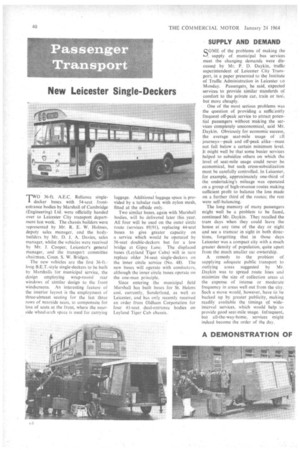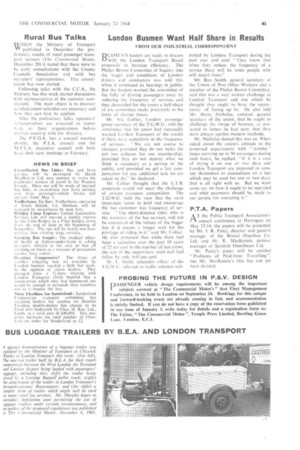New Leicester Single-Deckers
Page 42

Page 43

If you've noticed an error in this article please click here to report it so we can fix it.
Two 36-ft. A.E.C. Reliance single" decker buses with 54-seat frontentrance bodies by Marshall of Cambridge (Engineering) Ltd. were officially handed over to Leicester City transport department last week. The chassis builders were represented by Mr. R. E. W. Holmes, deputy sales manager, and the bodybuilders by Mr. D. .1. A. Davies, sales manager, whilst the vehicles were received by Mr. J. Cooper, Leicester's general manager, and the transport committee chairman, Coun. S. W. Bridges. The new vehicles are the first 36-ft.long B.E.T.-style single-deckers to be built by Marshal's for municipal service, the design employing wrap-round rear windows of similar design to the front windscreens. An interesting feature of the interior layout is the employment of three-abreast seating for the last three rows of nearside seats, to compensate for loss of seats at the front, where the nearside wheel-arch space is used for carrying luggage. Additional luggage space is provided by -a tubular rack with nylon mesh, fitted at the offside only. Two similar buses, again with Marshall bodies, will be delivered later this year. All four will be used on the outer circle route (services 89/91), replacing 44-seat buses to give greater capacity on a service which would be operated by 56-seat double-deckers but for a low bridge at Gipsy Lane, The displaced buses (Leyland Tiger Cubs) will in turn replace older 34-seat single-deckers on the inner circle service (No. 48). The new buses will operate with conductcrs, although the inner circle buses operate on the one-man principle. Since entering the municipal field Marshall has built buses for St. Helens and, currently, Sunderland, as well as Leicester, and has only recently received an order from Oldham Corporation for four 41-scat dual-entrance bodies on Leyland Tiger Cub chassis.
• SUPPLY AND DEMAND
S,OME of the problems of making the supply of municipal bus services meet the changing demands were discussed by Mr. P. D. Daykin, traffic superintendent of Leicester City Transport, in a paper presented to the Institute of Traffic Administration in Leicester en Monday. Passengers, he said, expected services to provide similar standards of comfort to the private car, train or taxi, but more cheaply. One of the most serious problems was the question of providing a suffic:ently frequent off-peak service to attract potential passengers without making the services completely uneconomical, said Mr. Daykin. Obviously for economic success, the average seat-mile usage of all journeys—peak and off-peak alike—must not fall below a certain minimum level. It might well be that some busier services helped to subsidize others on which the level of seat-mile usage could never be economical, but such cross-subsidization must be carefully controlled. In Leicester, for example, approximately one-third of the undertaking's mileage was operated on a group of high-revenue routes making sufficient profit to -balance the loss made on a further third of the routes; the rest were self-balancing. The long memory of many passengers might well be a problem to be faced, continued Mr. Daykin. They recalled the tram days when they could leave the house at any time of the day or night and see a tramcar in sight in both directions, forgetting that in those days Leicester was a compact city with a much greater density of population, quite apart from the much smaller car ownership. A remedy to the problem of supplying adequate public transport to outlying areas suggested by Mr. Daykin was to spread route lines and minimize the size of collection areas at the expense of intense or moderate frequency in areas well out from the city. Such a move would, however, have to" be backed up by greater publicity, making readily available the timings of wideinterval services, which would help to provide good seat-mile usage. -Infrequent, but all-the-way-home, services might indeed become the order of the day.
Rural Bus Talks
\-y/HEN the Ministry of Transport VV published in December the preliminary results of rural passenger transport surveys (The Commercial Motor, December 20) it stated that there were to be early consultations with the County Councils Association and with bus ope'rators' representatives. This consultation has now started.
Following talks with the C.C.A., the Ministry has this week started discussions with representatives of the operator associations. The main object is to discover to what extent subsidies are necessary and how they can best be applied.
After the preliminary talks, operators' renresentatives are expected to report haek to their organizations before amather meeting with the Ministry.
The P.V.O.A. has a council meeting shortly, the P.T.A. council and the M.P.T.A. executive council will both have their -next meetings in February.
NEWS IN BRIEF
Co-ordinated Bus Links: Bus and ferry services will be developed by David MaeBrayne Ltd. ELeXi summer to revive the neiditional patternof travel in the Western Islands. More use will be made of internal ho s links to co-ordinate new ferry services and three passenger-vehicle ferries will operate from May 1.
Trolleyhuses To Go: Trolleybuses operating at South Shields, Co. Durham. will be replaced by motorbuses by next July. Ilaiiday Camp Express: United Automobile Services Ltd. will operate a weekly ekpress so: vice from Redcar to a Filey holiday camp from the end of June to the beginning of September. The run will be nearly one hour ideleker than existing stage services.
Smoking Ban Sought: The medical officer of health at Ashten-under-Lyne is asking transport officials in the area to ban all smoking un buses as a measure of precaution egii last lung cancer.
ON erthne Comprontise? The threat of another crippling ban on overtime by London busmen receded a little last week, in the opinion of union leaders. They emerged from a 3L-hour meeting with London Transport chiefs hopeful that a compromise which they had hammered out would he enough to persuade their members not to re-impose the ban.
More Fleetlines for Sunderland: Sunderland Corporation transport committee has ilecepted tenders for another six Daimler Fleetline double-decker bus chassis to be tined with bodywork by Chas. H. Roe. Ltd., Leeds, at a total cost of £40,858. This new order increases the total number of Fleet.lines on order for Sunderland to 12.
























































































































